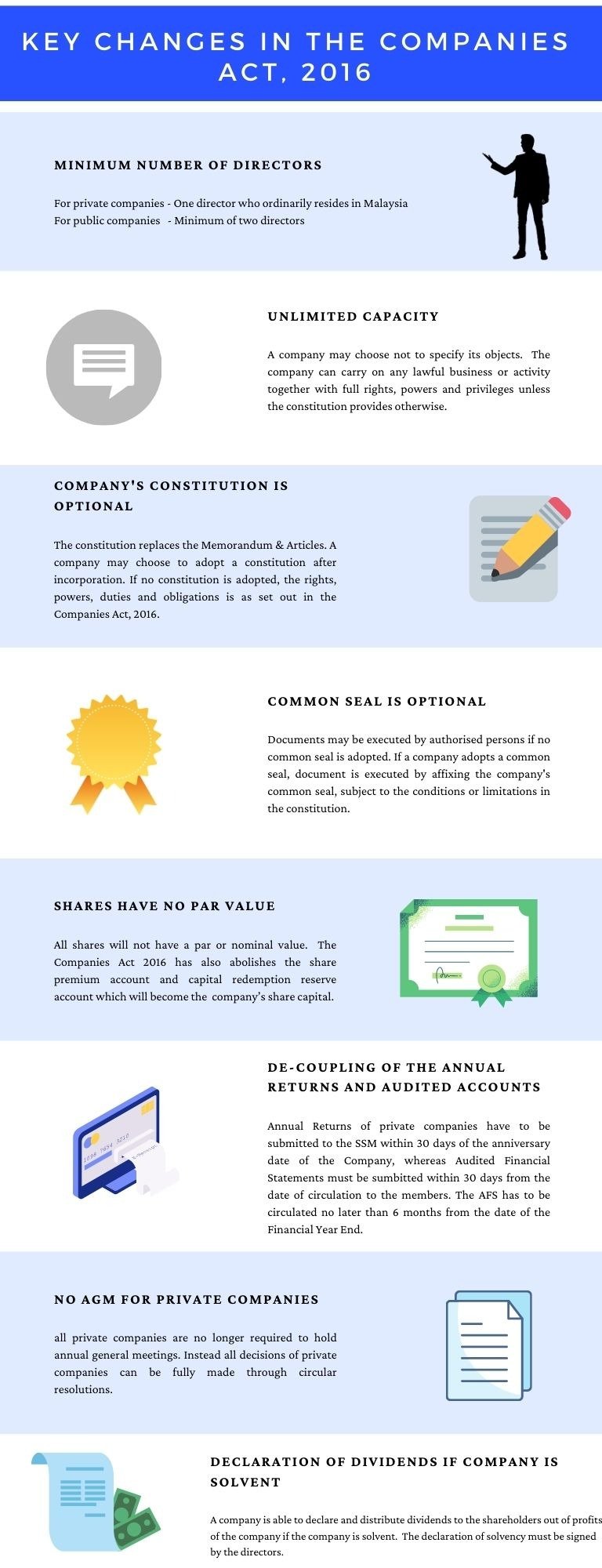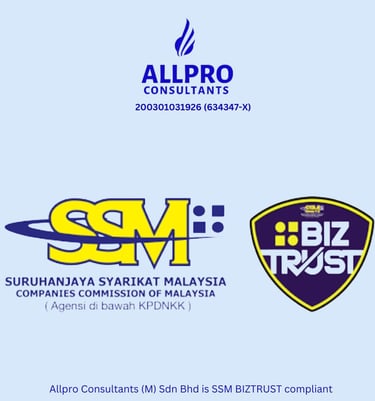What are the key changes in the Malaysian Companies Act, 2016.
This post highlights the main changes that have made to the Companies Act 1965 (repealed ) and now known as the Companies Act, 2016. The changes help companies simply the act of doing business in Malaysia
COMPANY SECRETARY BUSINESS SOLUTIONSDIGITAL SECRETARYCOMPANY SECRETARIAL SECRETARIAL MATTERSMALAYSIA COMPANIES ACT, 2016 SECRETARIAL FEES MALAYSIADIGITAL SECRETARY MALAYSIASTART COMPANYSTART BUSINESS INCORPORATE SDN BHD DIGITAL COMPANY SECRETARY COMPANY SECRETARY MALAYSIAREGISTER COMPANY ONLINE MALAYSIA COMPANY INCORPORATION
Here's a look at some key changes that took place when the new Companies Act, 2016 was implemented on 31st January 2017.
Minimum number of directors
You can now incorporate a private limited company (sdn. bhd.) by just having a single shareholder and single director (previously the minimum number was 2 directors / shareholders) – the sole director can also be the sole member/shareholder of the private company. The director has to be ordinarily resident in Malaysia and at least 18 years of age. The sole director or the last remaining director of a private company cannot resign until a meeting of members /shareholders is called to receive the notice of resignation and to appoint one or more new directors. However, for public companies, the Companies Act 2016 still provides for a minimum requirement of 2 directors.
Unlimited capacity
A company may choose not to specify its objects, as it has unlimited capacity. This means that the company can carry on any lawful business or activity together with full rights, powers and privileges unless the constitution provides otherwise.
Constitution of the Company is optional
It is no longer mandatory to adopt a constitution (previously known as the Memorandum & Articles of the Company) upon incorporation. A company may choose to adopt one at a later date but if it does not, then the provisions of the Companies Act 2016 can be used as a constitution. The company, directors, and shareholders have the rights, powers, duties and obligations as provided for in the Act.
Adoption of Common Seal is optional
Adoption of the common seal is no longer mandatory. A company can choose to have a common seal or not. When no common seal has been adopted, Section 66 of the Companies Act, 2016 regulates the execution of documents by a company. The execution of a document by a company is valid if it is signed on behalf of the company by at least two (2) authorised officers, one (1) of whom must be a director (“authorised officer” means director, secretary or any other person as approved by the board); or in the case of sole director, that sole director and must be witnessed.
Document signed in accordance with the above shall have the same effect as if the document is executed under the common seal of the company.
Note: Common seal should be kept for time being because execution by company under common seal is still required under certain conditions, such as on instrument of transfer, charges, caveats and other forms prescribed by National Land Code 1965.
Authorised capital and nominal value of shares no longer exists
Shares issued now no longer have a par or nominal value. All shares to be issued will no longer be tied to a nominal value. A company may issue shares at any price it deems fit, depending on the factors affecting the current circumstances and needs of the company and the directors owe a fiduciary duty to the Company to set the right price in good faith.
Hence, related concepts to the par value regime such as the share premium accounts, capital redemption reserve and authorised capital, will no longer exist. Whatever proceeds of the shares will be credited to the share capital account. This would greatly simplify the company’s accounts and corporate governance procedure as well as provide companies greater flexibility in structuring their share capital.
De-coupling of the Annual Return lodgement and submission of the Audited Financial Statements
The Annual Returns of the Company will have to be lodged with the Registrar of Companies within 30 days from the date of the company's anniversary of incorporation, whereas the audited financial statements will need to be circulated to its members within 6 months from the date of the financial year end and submission made within 30 days from the date of circulation. This is applicable for all private companies.
No AGMs for private companies
It is no longer mandatory for a private company to hold an Annual General Meeting in every calendar year. All meetings of a private company are known as meeting of members. All decisions of private companies can be fully made through circular resolutions, except for removal of directors and removal of auditors which still require a physical meeting of shareholders to be held.
There is also a mechanism for the automatic reappointment of auditors, unless the shareholders decide otherwise.
However, the requirement for AGM for public companies is maintained.
The written resolution procedures are applicable only to private companies.
The written resolutions are passed in accordance to the required majority as
though it is passed at an actual meeting. This means that if the written resolution is an ordinary resolution, a simple majority of members who are eligible to vote is sufficient to pass the resolution. Whereas, a special resolution will require 75% or more of members who are eligible to vote to pass the resolution.
Other key changes that may affect your company can be read here for more information. Should you require further clarification, you may contact us.
Sources : The Companies Act, 2016 (Malaysia) - FAQs






